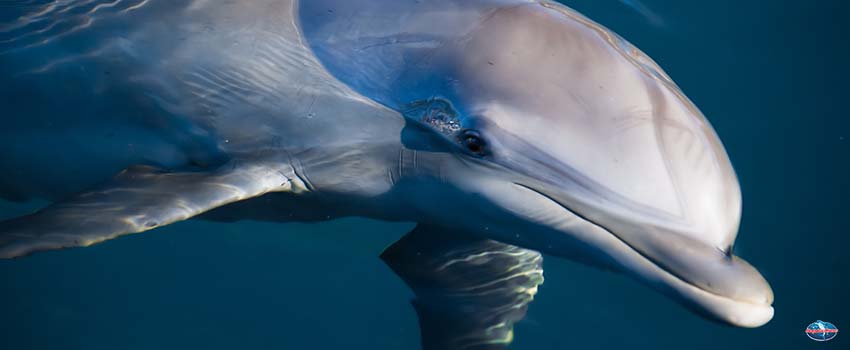One of the most well-known facts about dolphins involves their knack for swimming with boats. Visitors to John’s Pass come expecting to see the native dolphins up close and personal while at sea. Dolphins cutting through the water in the wake of a vessel is not a rare sight. But why do dolphins swim with boats? Studying the nature of these friendly animals offers insight into why these mammals travel alongside our boats.
Curious by Nature
Known for being social animals, bottlenose dolphins are the most common in Boca Ciega Bay. They swim in and out of the bay and into the Gulf of Mexico through John’s Pass.
Now, imagine sitting in your living room and a dolphin floating by your window. More often than not, you’ll probably investigate what you saw out of sheer curiosity. Curious by nature, a dolphin’s instinct to investigate drives it to follow the intruder – be it a boat or otherwise.
Boats generate interesting sounds and disturbances in the water that attract dolphins. Tourists hoping to catch a glimpse of a bottlenose dolphin aboard the Dolphin Quest may not have to wait long for a pod to arrive.
In nature, most animals flee when disturbed by loud noises or something invades their territory. Dolphins are unique in this regard. Fearless to some extent, a dolphin’s curiosity wins out over caution. Whether it be a boat, whale, or something else, a dolphin’s curious nature is a well-known fact about dolphins.
Spy hopping is an act done by a curious dolphin. While poking its head from the water, a dolphin can catch a glimpse of its surroundings. Dolphins have excellent eyesight, be it under or above water. Be that a human aboard a boat or a threat such as a shark or a whale, witnessing a dolphin spy hopping is a memorable experience.
Hungry Hungry Dolphins
Marine mammals always hunt for food, and dolphins are no exception. A dolphin’s primary source of sustenance is fish, and many have learned that following certain boats could result in an easy meal.
Following in the wake of a fishing vessel could mean scavenging fish thrown overboard. An unlucky school of fish may be disturbed by a passing ship, making them easy prey for the dolphin. While attractive to a hungry dolphin, fishing nets threaten and catch them. Drift nets are banned in the European Union for this reason.
Having a healthy fear of humans is what keeps animals wild. However, rewarding a dolphin with food for making an appearance can lead to the animal expecting it from every boat it comes across and reduces its fear of humans. Feeding dolphins is illegal and prohibited by the Marine Mammal Protection Act. Recently, the National Oceanic and Atmospheric Administration fined a tourist from Kansas $1,250 for feeding a wild dolphin in Florida.
Izzy, a bottlenose dolphin rescued near North Padre Island in Texas, arrived recently at the Clearwater Marine Aquarium. Izzy had been in poor health due to interactions with humans. Feeding her from boats led to injuries, and her ability to forage for herself declined. As humans encroach on animal habitats, even on land, animals have equated humans with an easy meal. It’s important to remember that for wild animals to remain wild, the less human interaction they have, the better. Learning about dolphins is a good reminder of the necessity to respect nature.
Gotta Go Fast
A dolphin’s best friend is its speed. Agile and sleek, the bottlenose dolphin can swim up to 18 miles per hour. Using the wake generated by a boat can increase a dolphin’s speed. Or even better, make it so that the marine mammal can take it easy and use the vessel’s energy rather than its own.
Using free energy generated by a moving vessel is an intelligent way of conservation. For a wild animal, every ounce of energy is precious. Even for the wily dolphin, the time between meals is unpredictable.
It’s not all business for dolphins. For a dolphin, playtime is essential to learning and maintaining a healthy work/life balance. Being social animals, an entertaining way to interact with other dolphins is through racing. Whether against each other or with boats, it makes no difference. A speeding boat could prove a challenge to a dolphin. Further, hurdling through the air in the wake of a boat can be a fun activity for a dolphin looking to catch some hang time.
Some boats are equipped to generate a wake that can attract dolphins, such as Sunshine Scenic Tour’s Shark Boat. These artificial wakes are fun for dolphins to play in. Sometimes, attracting a pod of dolphins can lead to an unforgettable encounter.
Most often, bottlenose dolphins come in pods of up to 20. Sometimes, male dolphins can travel in pods of hundreds! Watching them interact with each other while following in the wake of a boat is a bucket list event.
Being a Friend of Dolphins
Dolphin sightings cause tourists from the world over to visit John’s Pass all year round. Aboard the Dolphin Quest, sightseers will more often than not spot the Boca Ciega Bay’s resident bottlenose dolphins. However, it’s important to remember what makes a dolphin encounter healthy to ensure dolphin sightings continue. Learning facts about dolphins can help us better appreciate the natural world’s wildness.
According to Audubon of Florida, Boca Ciega Bay acts as a “closed” area for the population of dolphins within. Sometimes, dolphins from the Gulf of Mexico can visit Tampa Bay. This includes spotted, striped, spinner, and Risso’s, to name a few. Since 1975, scientists have studied the roughly 550-strong population in Tampa Bay.
See dolphins in action today.
The best way to witness the majesty of a pod of dolphins is by taking a dolphin cruise on Madeira Beach. The Dolphin Quest and Shark Boat Eco-educational tour leave daily from John’s Pass, St. Petersburg. Their boats are specially designed to attract dolphins and keep passengers safe and free to enjoy the experience.







